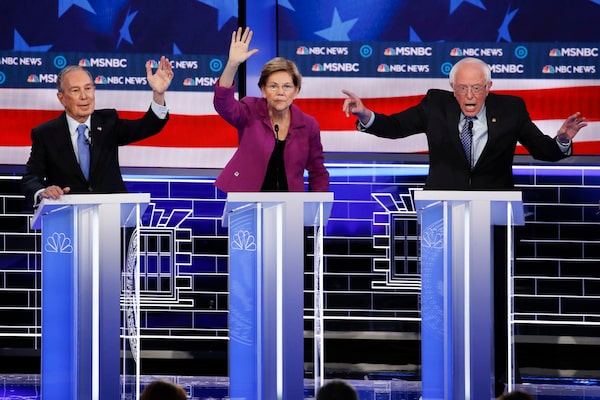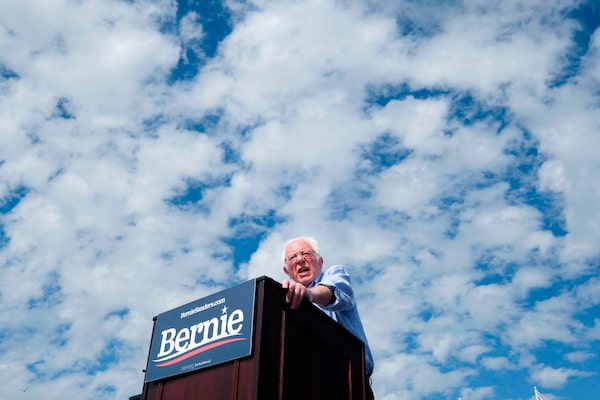Democratic U.S. presidential candidate Senator Bernie Sanders gestures during a Get Out the Early Vote campaign rally in Santa Ana, Calif., on Feb. 21, 2020.MIKE BLAKE/Reuters
On a midwinter Saturday night in downtown Cedar Rapids, a small industrial city on the Iowa plains, more than 3,000 young, boisterous fans filed into a show at the local arena.
The band was Vampire Weekend. But it wasn’t the main attraction.
Instead, the cheering, screaming, stomping crowd was there for a 78-year-old self-described socialist running for president.
Democratic delegate tracker: Who’s ahead, who’s behind in the U.S. presidential nomination race
“Bernie Sanders has been fighting for the same issues for such a long time,” enthused Aaron Gould, a 20-year-old university student who had travelled from Minnesota to see the Vermont senator. “If you hear him speak for like 10 minutes, you’re like ‘this guy has got it figured out.’ ”
The youthful adulation that treats Mr. Sanders more like an indie rock star than a politician has made him the improbable front-runner for the Democratic nomination. He won the most votes in Iowa and New Hampshire, leads national polls and could score a hat trick when Nevada becomes the third state to vote Saturday.
The senator’s strength is making the party establishment apoplectic. Moderates fear his ambitious policy prescriptions will either hand the election to President Donald Trump or be impossible to implement. And the zeal of some of his most loyal supporters – many of whom say they will not even vote Democratic in November if Mr. Sanders is not the nominee – has led to ugly campaign-trail confrontations.

Supporters of Democratic presidential candidate Sen. Bernie Sanders (I-VT) attend his "Get Out the Early Vote" rally at Valley High School on February 21, 2020 in Santa Ana, California.David McNew/Getty Images
It has even raised the possibility of the first brokered convention in nearly 70 years, where Mr. Sanders’s rivals would team up to deny him the nomination even if he wins the most votes.
But the tenacious septuagenarian is so far defining the race. In an era of rising income inequality and persistent economic precariousness, Mr. Sanders has constructed a durable coalition of millennial and working-class voters with talk of revolution: Medicare-for-all single-payer health care, free university tuition, a US$15 an hour minimum wage and fighting climate change.
It has also helped that Mr. Sanders has largely held the same political views since the 1960s, conveying on him that most coveted of rock-star qualities: authenticity.
“The country’s becoming an oligarchy,” said Randy Henshaw, a 56-year-old retired nurse at a rally for Mr. Sanders on the University of Nevada campus. “I would like to see us transfer back to a democracy.”
While the senator presents himself as something of an anti-politician, he is also skilled at doing all the things political consultants advise candidates to do. He distills complex issues into simple soundbites. His message is easy to remember. Every performance is even, every speech roughly the same.

From left, Democratic presidential candidates, former New York City Mayor Mike Bloomberg, Sen. Elizabeth Warren, D-Mass.; and Sen. Bernie Sanders, I-Vt., participate in a Democratic presidential primary debate Wednesday, Feb. 19, 2020, in Las Vegas.John Locher/The Associated Press
“We are the wealthiest country in the history of the world, yet most of us don’t know that because almost all new income and wealth goes to the people on top,” he declared in Reno this week. “We have 500,000 people today sleeping out on the streets, and yet we give tax breaks to billionaires.”
The fractious field has also worked to his advantage. Joe Biden, Michael Bloomberg, Pete Buttigieg and Amy Klobuchar are all vying to be the moderate alternative, while Elizabeth Warren is running as a less strident leftist.
It has all given Mr. Sanders staying power as his rivals have careened up and down in the polls. He has also consistently collected more in donations than any other candidate, despite refusing to do corporate fundraisers. Even a heart attack last fall was not enough to derail his campaign.
Mr. Sanders could build up a formidable lead in convention delegates as early as Super Tuesday on March 3, when major states such as California and Texas vote.
But if he fails to win an absolute majority, the other candidates could deny him the nomination by combining forces at the Democratic National Convention in Milwaukee, Wis., in July. None of Mr. Sanders’s opponents would rule out this possibility at this week’s debate. If so, it would be the first brokered convention since 1952.

Democratic presidential candidate Sen. Bernie Sanders (I-VT) greets supports at his Get Out the Early Vote rally at Valley High School on February 21, 2020 in Santa Ana, California.David McNew/Getty Images
Such a messy result would only exacerbate the party’s divides.
Stephen Cardinal, 38, said he didn’t vote in the 2016 general election after ostensibly neutral Democratic National Committee officials were caught plotting to help Hillary Clinton’s candidacy over Mr. Sanders’s in the primaries. Mr. Cardinal said he might do the same this year if someone other than Mr. Sanders is nominated.
“There should be a consequence to any action, and the Democrats needed to understand that,” said Mr. Cardinal, who runs a company providing essential oils in Fairfield, Iowa.
On the campaign trail, Mr. Sanders’s supporters tend to be the most aggressive. At one all-candidates’ forum in New Hampshire, for instance, they roundly booed Mr. Buttigieg. They were also accused of a campaign of online harassment targeting the leaders of Nevada’s Culinary Union after it came out against Mr. Sanders’s health-care proposal.
The senator, for his part, inspires sometimes livid reactions from his rivals’ supporters.

Democratic presidential hopeful Vermont Senator Bernie Sanders addresses a rally at Valley High School in Santa Ana, California, February 21, 2020.RINGO CHIU/AFP/Getty Images
“Bernie’s the Left Trump,” said Roberta Lunnis, a 58-year-old commercial wallpaper hanger in Nevada who is voting for Ms. Warren. “It’s going to be a riot between his supporters and Trump’s supporters. They’re both very bullyish and I don’t want that.”
The most frequently cited criticisms are that Mr. Sanders’s agenda will alienate moderate voters or be impossible to get through Congress. People already happy with their private health insurance plans, the argument goes, will turn away from the Democratic Party if it pledges to replace those plans with a public system.
Mr. Sanders answers these arguments by contending his platform can motivate the roughly half of the electorate that doesn’t vote. And he points to the numerous times he has successfully amended legislation during his three decades in Congress as proof of his ability to get things done.
To Mr. Sanders’s supporters, it’s the Democrats’ own cautious centrism that has proven ineffective in delivering substantial change.
Ben Calegari, a 28-year-old software engineer from New Hampshire, grew up in Democratic circles as his father worked on a string of political campaigns. He has childhood photos with Bill Clinton and Al Gore. John Kerry once visited his house. But he became disenchanted with the incrementalism such politicians represented.
“I witnessed the insularity of the Democratic Party,” he said, sitting in a Manchester coffee shop, a brass pin of Mr. Sanders’s face on his green bomber jacket. “These people are never held accountable when they fail."
 Adrian Morrow
Adrian Morrow Tamsin McMahon
Tamsin McMahon